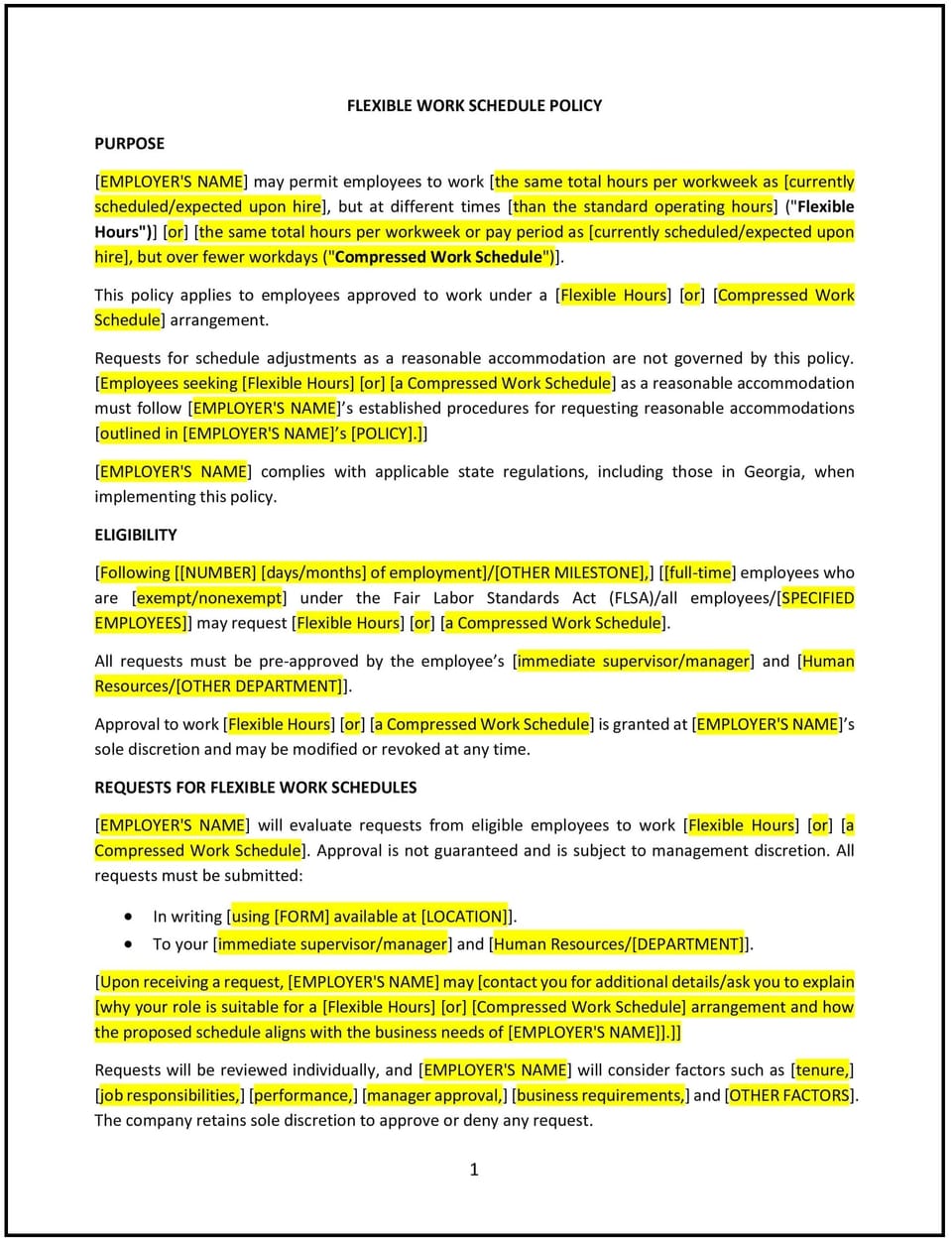Flexible work schedule policy (Georgia): Free template

Flexible work schedule policy (Georgia)
This flexible work schedule policy is designed to help Georgia businesses provide employees with options to adjust their working hours to better balance professional and personal responsibilities. The policy outlines eligibility criteria, scheduling options, and procedures for requesting flexible work arrangements.
By implementing this policy, businesses can boost employee morale, enhance productivity, and adapt to the evolving needs of their workforce.
How to use this flexible work schedule policy (Georgia)
- Define flexibility options: Specify the types of flexible work arrangements available, such as compressed workweeks, flextime, or remote work.
- Identify eligibility criteria: Outline which employees or roles are eligible for flexible work schedules based on job responsibilities and business needs.
- Provide request procedures: Establish a clear process for employees to request flexible schedules, including submitting written proposals and discussing with supervisors.
- Set scheduling guidelines: Specify rules for establishing start and end times, break periods, and core working hours if applicable.
- Address performance expectations: Emphasize that employees must meet productivity and performance standards regardless of their schedule.
- Include a trial period: Allow for a trial phase to assess the feasibility of the flexible arrangement and make adjustments as needed.
- Communicate approval protocols: Clearly state who has the authority to approve or modify flexible work requests, such as managers or HR.
- Review and update regularly: Periodically assess the policy to ensure it reflects changes in Georgia workplace practices, employee needs, or business goals.
Benefits of using this flexible work schedule policy (Georgia)
Implementing this policy provides several advantages for Georgia businesses:
- Increases employee satisfaction: Flexibility supports work-life balance, leading to higher morale and engagement.
- Enhances productivity: Employees often perform better when given control over their schedules.
- Attracts top talent: Offering flexible schedules makes businesses more appealing to a diverse and skilled workforce.
- Reduces absenteeism: Employees with flexible options are less likely to miss work due to personal commitments.
- Reflects Georgia-specific practices: Tailoring the policy to local workforce dynamics ensures its relevance and effectiveness.
Tips for using this flexible work schedule policy (Georgia)
- Communicate options: Ensure employees understand the types of flexible arrangements available and how they can request them.
- Maintain fairness: Apply the policy consistently to all eligible employees to avoid perceptions of favoritism.
- Monitor effectiveness: Regularly review how flexible schedules impact productivity and employee satisfaction.
- Provide feedback channels: Encourage employees to share their experiences with flexible arrangements to identify areas for improvement.
- Adapt as needed: Be willing to adjust schedules or arrangements based on feedback, business needs, or changes in Georgia labor trends.
Q: What types of flexible work schedules are available under this policy?
A: Options may include flextime, compressed workweeks, part-time schedules, or remote work, depending on the business’s needs and the employee’s role.
Q: Who is eligible for a flexible work schedule?
A: Eligibility is determined based on job responsibilities, employee performance, and the feasibility of flexible arrangements within the business.
Q: How can employees request a flexible schedule?
A: Employees should submit a written proposal to their supervisor or HR, outlining the requested arrangement and how they plan to meet job requirements.
Q: Are flexible schedules permanent?
A: Flexible arrangements may be subject to a trial period or periodic review to ensure they meet the needs of both the business and the employee.
Q: How will performance be evaluated for employees with flexible schedules?
A: Performance will be assessed based on established productivity and quality standards, regardless of the employee’s work hours.
Q: Can flexible schedules be revoked?
A: Yes, if the arrangement negatively impacts performance or business operations, businesses should discuss adjustments or revoke the schedule as necessary.
Q: How often should this policy be reviewed?
A: The policy should be reviewed annually or as needed to reflect changes in Georgia’s workplace dynamics or labor trends.
This article contains general legal information and does not contain legal advice. Cobrief is not a law firm or a substitute for an attorney or law firm. The law is complex and changes often. For legal advice, please ask a lawyer.


